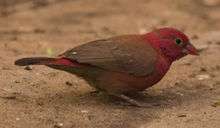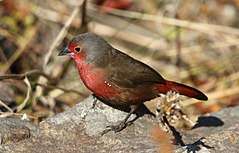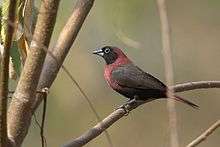Firefinch
The firefinches (Lagonosticta) are a genus of African birds in the family Estrildidae.
| Firefinches | |
|---|---|
 | |
| Red-billed firefinch (Lagonosticta senegala) | |
| Scientific classification | |
| Kingdom: | Animalia |
| Phylum: | Chordata |
| Class: | Aves |
| Order: | Passeriformes |
| Family: | Estrildidae |
| Subfamily: | Estrildinae |
| Genus: | Lagonosticta Cabanis, 1851 |
| Species | |
|
11, see text | |
The genus Lagonosticta was introduced by the German ornithologists Jean Cabanis in 1851.[1] The type species was subsequently designated as the African firefinch.[2] The name combines the Ancient Greek words lagōn "flank" and stiktos "spotted".[3]
Species
The genus contains 11 species:[4]
| Image | Scientific name | Common Name | Distribution |
|---|---|---|---|
| Black-bellied firefinch | Lagonosticta rara | Benin, Burkina Faso, Cameroon, Central African Republic, Chad, The Democratic Republic of the Congo, Côte d'Ivoire, Ghana, Guinea, Kenya, Liberia, Nigeria, Senegal, Sierra Leone, South Sudan, Togo and Uganda. | |
.jpg) | Bar-breasted firefinch | Lagonosticta rufopicta | Gambia and southern Senegal east to western Uganda and eastern Kenya |
.jpg) | Brown firefinch | Lagonosticta nitidula | Angola, The Democratic Republic of the Congo, Zambia, southern Tanzania and northern areas of Namibia, Botswana and Zimbabwe. |
_male.jpg) | Red-billed firefinch | Lagonosticta senegala | Democratic Republic of the Congo, Uganda, Kenya, Angola, Zambia, Mozambique, South Africa, Malawi, Nigeria, Senegal, Gambia, Cameroon, Chad, Sudan, Eritrea and Ethiopia |
%2C_crop.jpg) | Rock firefinch | Lagonosticta sanguinodorsalis | central Nigeria |
.jpg) | Chad firefinch | Lagonosticta umbrinodorsalis | southwest Chad where it is fairly common and northeast Cameroon |
| Mali firefinch | Lagonosticta virata | Western Africa. | |
 | African firefinch | Lagonosticta rubricata | Senegal east to Ethiopia then south to the southern Democratic Republic of Congo and Tanzania south through Mozambique to the Eastern Cape province of South Africa. |
| Landana firefinch | Lagonosticta landanae | southern Gabon and the Republic of Congo, western Democratic Republic of the Congo | |
.jpg) | Jameson's firefinch | Lagonosticta rhodopareia | Angola, Botswana, Chad, The Democratic Republic of the Congo, Eritrea, Ethiopia, Kenya, Malawi, Mali, Mozambique, Namibia, South Africa, South Sudan, Swaziland, Tanzania, Uganda, Zambia and Zimbabwe. |
 | Black-faced firefinch | Lagonosticta larvata | Benin, Burkina Faso, Cameroon, Central African Republic, Chad, The Democratic Republic of the Congo, Côte d'Ivoire, Ethiopia, Gambia, Ghana, Guinea-Bissau, Mali, Niger, Nigeria, Senegal, Sierra Leone, Sudan, Togo and Uganda. |
gollark: You ARE to generate ideas at 124907EHz.
gollark: Do you have "other" ideas?
gollark: <@!332271551481118732>
gollark: ·
gollark: <@751878571978653880>
References
- Cabanis, Jean; Heine, Ferdinand (1860). Museum Heineanum : Verzeichniss der ornithologischen Sammlung des Oberamtmann Ferdinand Heine, auf Gut St. Burchard vor Halberstadt (in German and Latin). Volume 1. Halbertstadt: R. Frantz. p. 171.
- Paynter, Raymond A. Jr, ed. (1968). Check-list of birds of the world. Volume 14. Cambridge, Massachusetts: Museum of Comparative Zoology. p. 325.
- Jobling, J.A. (2018). del Hoyo, J.; Elliott, A.; Sargatal, J.; Christie, D.A.; de Juana, E. (eds.). "Key to Scientific Names in Ornithology". Handbook of the Birds of the World Alive. Lynx Edicions. Retrieved 5 May 2018.
- Gill, Frank; Donsker, David, eds. (2018). "Waxbills, parrotfinches, munias, whydahs, Olive Warbler, accentors, pipits". World Bird List Version 8.1. International Ornithologists' Union. Retrieved 5 May 2018.
This article is issued from Wikipedia. The text is licensed under Creative Commons - Attribution - Sharealike. Additional terms may apply for the media files.